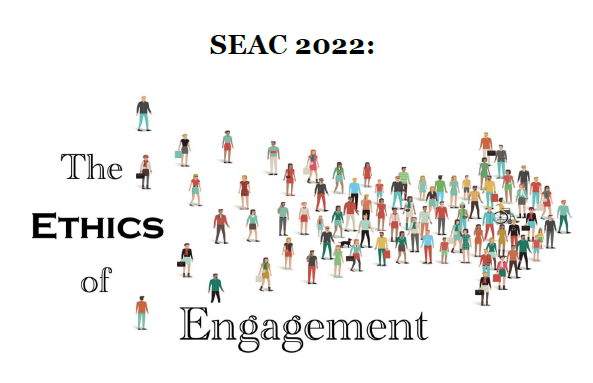
Event Title
Concurrent Session 7D
Location
D: Room 209 (Bryant Hall, second floor)
Start Date
8-10-2022 10:25 AM
End Date
8-10-2022 11:35 AM
Description
- Including Course Materials for Developing Interpersonal Compassion in General Education Courses / Gareth Fuller, Independent Scholar
The importance of compassion in all walks of life has often been stressed. The importance in, say, healthcare or education is often written into statements of professional organizations. Teaching general education courses, our students that wind up in these, and many other fields. While professional organizations and fields of study have their own courses for teaching compassion relevant to their field, this does not mean that it has no place in general education. While compassion can be understood in many ways, I focus on compassion for interpersonal relationships. I argue that one key component for teaching compassion is examining questions of moral agency. I argue that incorporating materials that highlight the role of circumstance and luck in the outcomes of behavior is important and how this interacts with our evaluations of people can help develop compassion. In the remainder of this paper, I examine the problem of incorporating compassion as a measurable outcome in a general education course. While reading and lecture is an important component to learning, assignments are especially important. I present some potential in-class and take home assignments that might be incorporated into a variety of general education courses. I then discuss some potential shortcomings of my approach, in particular its limited application in some general education science and math courses. To highlight application of my approach, I draw on experience teaching several general education philosophy courses. - The Importance of Sentiment in Promoting Reasonableness in Children / Michael Pritchard, Western Michigan University (Prof. emeritus)
Following their English predecessor Joseph Butler, eighteenth-century Scottish philosophers Thomas Reid and Adam Smith identified key elements in the makeup of young children that support the idea that they can begin to acquire fundamental features of reasonableness. I will discuss my recently published, The Importance of Sentiment in Promoting Reasonableness in Children (Anthem, 2022), which revisits their accounts. Special attention is given to how their views on sentiments can support current efforts to promote the philosophical thinking of children. Despite his admiration of Butler’s work and his familiarity with the writings of Reid and Smith, their contemporary David Hume did not directly discuss Butler’s reflections on these matters. However, in “Meekness and ‘Moral’ Anger” (Ethics, January 2012), Glen Pettigrove offers an account of eighteenth-century Scotland’s regard for meekness as a virtue that might shed some light on why Hume took a different path. Pettigrove discusses in detail how meekness was standardly regarded as a moral virtue in eighteenth-century Scotland. Hume shared this view of meekness. Today meekness is commonly regarded as a sign of weakness and moral submissiveness. However, Hume and his contemporaries understood it as exhibiting moral strength and anything but submissiveness. In line with Reid and Smith, supporters of meekness as a virtue subjected anger to critical resistance, suggesting that Hume could have shared the concern to advance the development of reasonableness in children as an alternative.
I conclude that all of this should be welcomed by today’s supporters of the philosophical thinking of children.
Session Chair: Amy Wells Dolan, University of Mississippi
Relational Format
conference proceeding
Recommended Citation
Fuller, Gareth; Pritchard, Michael; and Dolan, Amy Wells, "Concurrent Session 7D" (2022). Society for Ethics Across the Curriculum Conference. 45.
https://egrove.olemiss.edu/seac/2022/schedule/45
COinS
Oct 8th, 10:25 AM
Oct 8th, 11:35 AM
Concurrent Session 7D
D: Room 209 (Bryant Hall, second floor)
- Including Course Materials for Developing Interpersonal Compassion in General Education Courses / Gareth Fuller, Independent Scholar
The importance of compassion in all walks of life has often been stressed. The importance in, say, healthcare or education is often written into statements of professional organizations. Teaching general education courses, our students that wind up in these, and many other fields. While professional organizations and fields of study have their own courses for teaching compassion relevant to their field, this does not mean that it has no place in general education. While compassion can be understood in many ways, I focus on compassion for interpersonal relationships. I argue that one key component for teaching compassion is examining questions of moral agency. I argue that incorporating materials that highlight the role of circumstance and luck in the outcomes of behavior is important and how this interacts with our evaluations of people can help develop compassion. In the remainder of this paper, I examine the problem of incorporating compassion as a measurable outcome in a general education course. While reading and lecture is an important component to learning, assignments are especially important. I present some potential in-class and take home assignments that might be incorporated into a variety of general education courses. I then discuss some potential shortcomings of my approach, in particular its limited application in some general education science and math courses. To highlight application of my approach, I draw on experience teaching several general education philosophy courses. - The Importance of Sentiment in Promoting Reasonableness in Children / Michael Pritchard, Western Michigan University (Prof. emeritus)
Following their English predecessor Joseph Butler, eighteenth-century Scottish philosophers Thomas Reid and Adam Smith identified key elements in the makeup of young children that support the idea that they can begin to acquire fundamental features of reasonableness. I will discuss my recently published, The Importance of Sentiment in Promoting Reasonableness in Children (Anthem, 2022), which revisits their accounts. Special attention is given to how their views on sentiments can support current efforts to promote the philosophical thinking of children. Despite his admiration of Butler’s work and his familiarity with the writings of Reid and Smith, their contemporary David Hume did not directly discuss Butler’s reflections on these matters. However, in “Meekness and ‘Moral’ Anger” (Ethics, January 2012), Glen Pettigrove offers an account of eighteenth-century Scotland’s regard for meekness as a virtue that might shed some light on why Hume took a different path. Pettigrove discusses in detail how meekness was standardly regarded as a moral virtue in eighteenth-century Scotland. Hume shared this view of meekness. Today meekness is commonly regarded as a sign of weakness and moral submissiveness. However, Hume and his contemporaries understood it as exhibiting moral strength and anything but submissiveness. In line with Reid and Smith, supporters of meekness as a virtue subjected anger to critical resistance, suggesting that Hume could have shared the concern to advance the development of reasonableness in children as an alternative.
I conclude that all of this should be welcomed by today’s supporters of the philosophical thinking of children.
Session Chair: Amy Wells Dolan, University of Mississippi


